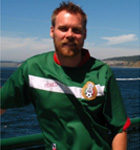
 Jonas Brodin has taught political science and public policy courses for The Swedish Program since 2008. His current research studies how the built environment molds relations of power, focusing on the specific case of roads to examine the relationship between built space and power. He enjoys spending time in nature, especially on the water, and once got second place in a completely rigged sports/trivia/beauty pageant competition for a variety show on British television.
Jonas Brodin has taught political science and public policy courses for The Swedish Program since 2008. His current research studies how the built environment molds relations of power, focusing on the specific case of roads to examine the relationship between built space and power. He enjoys spending time in nature, especially on the water, and once got second place in a completely rigged sports/trivia/beauty pageant competition for a variety show on British television.
It’s a well-worn cliché that college professors look forward to summer break just as much as students do, because now they finally have time to work. Is this true?
Well, yes and no. It’s certainly true that not having to write lectures and grade exams leaves more time for research. But the distinction between teaching and research as isolated types of work is false. To be an effective teacher, one needs to do a tremendous amount of research. Also, professors tailor their courses to their research interests: hopefully, all that work putting together a coherent and reasonably informative undergraduate course will become the basis for a publishable article or even a book.
At the same time, there is a lot of time between semesters, so what happens during that time? Are professors on vacation or not? Being an archetypical academic, I’d like to complicate that question a bit, by answering that it depends on what you mean by being on vacation. For academics, the concept of “time off” is very fluid. If a welder brings his torch and helmet to the beach, it would be weird, but if I’m lounging in a beach chair with a thick hardcover on continental philosophy, most people probably assume that I’m reading James Patterson’s latest celebrity group project. No one can accuse Foucault or Adorno of being a relaxing read, and sure, I’m reading it for work, but as strange as it might sound, it’s also fun. As I’m writing these words, I’m sitting on a gorgeous little island in the Stockholm archipelago, watching a Viking Line Star Destroyer chug past on its way to deposit its inebriated cargo in Helsinki, and that stack of articles on my desk seems very far away. But that reminds me: perhaps that lecture on EU integration should include a discussion on the Åland islands’ exemption from the common market so the cruise liners on the Baltic can keep selling tax-free booze?
In other words, even though professors have a lot of time off, we only rarely completely stop working. Almost anything we read or see, we try to turn into a useful research observation. Since I teach public policy, the border between work and not-work is even fuzzier. A tremendous amount of my time is spent keeping up with what is happening in the world and then going deeper and deeper into various rabbit holes of analysis, background, critiques, and finding more evidence.
What makes this particularly challenging is that on the one hand, much of students’ knowledge of public policy is acquired by reading the news, so they come into my courses already quite knowledgeable, but on the other hand, most of the policy analyses that one might come across when simply surfing on the internet are quite superficial, and they all tend to repeat the same points. This is natural, since thoughtful, thorough analyses take time to put together, and complex, nuanced arguments don’t make for good sound bites or click bait.
It’s relatively easy to find good articles on policy developments that are a few years old—for example, there is now a pretty solid literature on Brexit—but finding engaging, in-depth articles on recent developments, the developments that students are most interested in and that therefore will lead to the best discussions, is much harder. Right now, I am thinking about adding classes on the detention of migrants and the separation of migrant families in at least two of my courses for the fall. But how will I fit those classes in with the rest of the material, and where will I find the right readings?
So, if you see me reading a lot about migration detention this summer, I am of course doing it for work. But I’m also doing it because I find it interesting, which is why I described the line between work and time off as fuzzy: even I don’t know which type of reading is which. Most of my reading is like that: I pick up an article or a book that I find interesting, and only later does it turn out to be useful. Simply put, for college professors, anything we do might turn out to have been research, even if we were not aware of it at the time. The latest book reinterpreting the causes of mass incarceration? That’s research. The SpongeBob marathon I’m watching with the kids? That’s research, too.